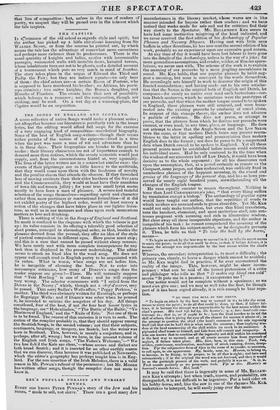THE SONGS OF ENGLAND AND SCOTLAND.
A coon collection of native Songs would make a pleasant series; not altogether because our literature is peculiarly rich in the lesser lyrics, but the editing would afford full scope for the exercise of a very engaging kind of composition—anecdottcal biography. Some of the best of English song-writers—though their verses rather partake of the nature of the epigram—lived in a time
when the poet was more a man of wit and adventure than he is in these days. Their biographies are blanks to the general
reader: their literary characters are not of importance enough to -demand more than notices, which the scanty materials would just supply, and, from the circumstances hinted at, very agreeably. The lives of the latter writers are in a somewhat similar case: the events of their pilgrimage are so little known to the multitude, that they would come upon them with the freshness of novelty and the peculiar charm that attends the obscure. If they furnished less of moving accidents than their elder brethren of the STUARTS and the Commonwealth, they would at least have their anecdotes
of town life and tavern jollity ; for your true small lyrist seems
mostly to have been a man of pleasure. A severe and tasteful selection of the songs themselves—regarding spirit and character
rather than mere prettiness or conventional formalities—if it did not exhibit poetry of the highest order, would at least convey a notion of the changes that have taken place in our lighter litera- ture, as well as in our manners and ideas upon such momentous matters as love and drinking. There is nothing of this in the Songs of England and Scotland. Its merit is confined to the elegance with which the volume is got
up : its value consists in its offering a tolerably good selection of short poems, arranged in chronological order, so that, besides the pleasure derived from the perusal, they offer an idea of the style of poetical composition in different ages. Here praise must stop; and this is a case that cannot be passed without sharp censure. We have rarely met with more complete incompetence for any task than is displayed in the present undertaking. The editor seems to attach no fixed idea to the word song. He does not appear well enough read in English poetry to be acquainted with its riches. What is worse, when songs are set before him, he is incapable of choosing the best. Not to enter into microscopic criticisms, how many of DIBDIN'S songs does the reader suppose are given ?—Three. He will naturally suppose that "Tom Bowling" is one of them ; and he will suppose very wrong. The selector commences with "I sailed from the
Downs in the Nancy ;" which, though not a chef-cfceuvre, may
be passed. That sorry Sadler's Wells affair, "Peggy Perkins," is another. The third was obviously written for Ranelagh, or perhaps
for Bagnigge Wells; and if DIBDIN was sober when he penned it, he intended to satirize the songsters of his day. All things .considered, four of the best, if not the four best lesser lyrics in the language, are" Holienlinden," "The Battle of the Baltic," "Ye ..Mariners of England," and the "Exile of Erin." Not one of them AS to be found. The reason of this omission it is vain to seek. The -notion of the compiler probably is, that they should appear among the Scottish Songs, in the second volume; not that their subjects, sentiroents, language, or imagery, are Scotch, but the writer was born in Scotland. This, however, is merely a conjecture, and is, perhaps, after all, wrong ; but we have, in the present volume of the English and Irish songs, "The Fisher's Welcome,"—" We twa hae fish'd the Kale sae clear;'—whose scenes and dialect are both broad Scotch ; and it is inserted for no other earthly reason that we can discover, than because it was published at Newcastle, which the editor's geography has perhaps taught him is in Eng- land. For the non-insertion of the Irish Melodies, there is a valid reason in Mr. POWER'S refusal of the permission; but Mr. MOORE has written other songs, though the compiler dues not seem to know it.






















 Previous page
Previous page